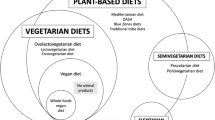factory farming (FAK-tuh-ree FAHR-ming) noun: an industrialized system of producing meat, eggs, and milk in large-scale facilities where the animal is treated as a machine
(Wordsmith 2008)
Abstract
Scientists have shown that the practice of factory farming is an increasingly urgent danger to human health, the environment, and nonhuman animal welfare. For all these reasons, moral agents must consider alternatives. Vegetarian food production, humane food animal farming, and in-vitro meat production are all explored from a variety of ethical perspectives, especially utilitarian and rights-based viewpoints, all in the light of current U.S. and European initiatives in the public and private sectors. It is concluded that vegetarianism and potentially in-vitro meat production are the best-justified options.
Similar content being viewed by others
Notes
No statistics are available for the number of aquatic animals slaughtered; however, it is thought that this number is likely equal to the land animals killed (HSUS 2008).
For an example of the latter sort of view see Frey (1989) and Frey and Paton (1989). Frey rejects speciesism but embraces experimentation and meat consumption. He consistently concludes that mentally disadvantaged humans could justifiably be vivisected. For his current thoughts on the justifiability of factory farming, see Frey (2004).
The one case where supplementation or fortification is required for vegans concerns vitamin B-12. Found in dairy products, eggs, and meat, B-12 does not occur naturally in plants. Fortified sources of B-12, such as cereals, are readily available.
References
Adams, C. (1990). The sexual politics of meat. New York, NY: Continuum.
Akers, K. (2008). How many vegetarians? Vegetarian Society of Colorado. http://www.vsc.org/1103-How-Many-Veggies.htm. Accessed 14 August 2008.
ADA Reports. (2003). Position of the American dietetic association and dieticians of Canada: Vegetarian diets. Journal of the American Dietetic Association, 103, 748–765.
Bentham, J. (1789, 1988 reprint). The principles of morals and legislation. Amherst, NY: Prometheus Books.
Bittman, Mark. (2008). Putting meat back in its place. The New York Times. http://www.nytimes.com/2008/06/d11/dining/11mini.html?_r=1&oref=slogin&parntner=rssy. Accessed 11 June 2008.
Bittman, Mark. (2009). Food matters: A guide to conscious eating. New York, NY: Simon & Shuster.
Callicott, J. B. (1980). Animal liberation: A triangular affair. Environmental Ethics, 2, 311–328.
Clark, S. R. L. (2006). Respecting sentient beings. Organization and Environment, 19, 280–283.
Curtin, D. (2004). Contextual moral vegetarianism. In S. Sapontzis (Ed.), Food for thought (pp. 272–283). Amherst, NY: Prometheus Books.
DeVault, G. (2008). Which comes first: The chicken or the profit? Mother Earth News, p. 25.
FDA Unveils Proposal to Fight Mad Cow. (2005). REDORBIT NEWS. http://www.redorbit.com/modules/news/tools.php?tool=print&id=260499. Accessed 26 July 2007.
FAO. (2006). Livestock a major threat to environment. <http://www.fao.org/newsroom/en/news/2006/1000448/index.html>http://www.fao.org/newsroom/en/news/2006/1000448/index.html. Accessed 29 November 2009.
Frey, R. G. (1989). The case against animal rights. In T. Regan & P. Singer (Eds.), Animal rights and human obligations (2nd ed., pp. 115–118). Englewood Cliffs, NJ: Prentice-Hall.
Frey, R. G. (2004). Utilitarianism and moral vegetarianism again: Protest or effectiveness? In S. Sapontzis (Ed.), Food for thought (pp. 118–123). Amherst, NY: Prometheus Books.
Frey, R. G., & Paton, W. (1989). Vivisection, morals, and medicine: An exchange. In T. Regan & P. Singer (Eds.), Animal rights and human obligations (2nd ed., pp. 223–236). Englewood Cliffs, NJ: Prentice-Hall.
Gruen, L. (2004). Empathy and vegetarian commitments. In S. Sapontzis (Ed.), Food for thought (pp. 124–137). Amherst, NY: Prometheus Books.
Gruzalski, B. (2004). Why it’s wrong to eat animals raised and slaughtered for food. In S. Sapontzis (Ed.), Food for thought (pp. 124–137). Amherst, NY: Prometheus Books.
Harris, G. (2009). President promises to bolster food safety. The New York Times. http://www.nytimes.com/2009/03/15/us/politics/15address.html. Accessed 15 March 2009.
How many vegetarians are there in the US?. (2006). Vegetarian Basic 101—Care2.com. http://www.care2.com/c2c/groups/disc.html?gpp=4121&pst=481813. Accessed 14 August 2008.
Humane Society of the United States (HSUS). (2008). An HSUS report: The welfare of animals in the meat, egg, and dairy industries. http://www.hsus.org/farm/resources/research/welfare/welfare_overview.html. Accessed 4 August 2008.
Hunger Notes. (2008). Pew Commission says industrial scale farm animal production poses “unacceptable” risks to public health, environment. http://www.worldhunger.org/articles/08/us/pew2.htm. Accessed 4 May 2008.
Kruglinski, S. (2008). Building a better burger. Discover Magazine, pp. 36–37.
Lavelle, M., & Garber, K. (2008). Fixing the food crisis. U. S. News and World Report, pp. 36–42.
Lederer, E. M. (2009). UN says world population to hit 7 billion by 2012. Associated Press. Yahoo News. http://news.yahoo.com/s/ap/20090312/ap_on_re_us/un_un_world_population_2. Accessed 14 March 2009.
Martin, A. (2007). Meat processors look for ways to keep ground beef safe. The New York Times. http://www.nytimes.com/2007/12/06/business/06meat.html?ei=5089&en=a6858b42952e2. Accessed 8 December 8 2007.
Martin, A. (2008). Largest recall of ground beef is ordered. The New York Times. http://www.Nytimes.com/2008/02/18/business/18recall.html?pagewanted=print. Accessed 13 August 2008.
Paper says edible meat can be grown in a lab on industrial scale. (2005). University of Maryland Newsdesk. http://www.newsdesk.umd.edu/schtech/print.cfm?articleID+1098. Accessed 13 June 2008.
Pfister, B. (2008). Meat CSAs catching on. Pittsburgh Tribune-Review. http://pittsburghlive.come/x/pittsburghtrib/news/cityregion/print_571712.html. Accessed 9 June 2008.
Pluhar, E. B. (1995). Beyond prejudice: The moral significance of human and nonhuman animals. Durham, NC: Duke U. Press.
Pluhar, E. B. (2004). The right not to be eaten. In S. Sapontzis (Ed.), Food for thought (pp. 92–107). Amherst, NY: Prometheus Books.
Pollan, M. (2006). The omnivore’s dilemma. New York, NY: Penguin Books.
Rawls, J. (1971). A theory of justice. Cambridge, MA: Harvard U. Press.
Regan, T. (1983). The case for animal rights. Berkeley: U. of California Press.
Regan, T. (2001). Defending animal rights. Urbana: U. of Illinois Press.
Revkin, A. (2008). Can people have meat and a planet too? The New York Times. dotearth.blogs.nytimes.com/2008/04/11. Accessed 11 April 2008.
Sagoff, M. (1984). Animal liberation and environmental ethics: Bad marriage, quick divorce. Osgood Hall Law Journal, 22, 303–304.
Sandhana, L. (2006). Test tube meat nears dinner table. Common Dreams News Center. http://www.commondreams.org/cgi-bin/print.cgi?file+headline06/0621-03.htm. Accessed 13 June 2008.
Sayre, Laura. (2009). The hidden link between factory farms and human illness. Mother Earth News, pp. 76–83.
Scientists aim for lab-grown meat. (2005). BBC News. http://newsvote.bbc.co.uk/mpapps/pagetools/print/news.bbc.co.uk/2/hi/science/nature/4148. Accessed 13 June 2008.
Scientists offered $1 million to grow laboratory chicken. (2008). CNN Headline News. http://www.cnn.com/2008/WORLD/americas/04/23/peta.chicken/index.html. Accessed 13 June.
Seven children wait for their IVF sibling. (2008). Baby Web. http://www.babyweb.com.u/modules.php?name_News&file+print&sid+832. Accessed 1 September 2008.
Singer, P. (1990). Animal liberation (2nd ed.). New York: Random House.
Singer, P. (2004). Animal liberation: Vegetarianism as protest. In S. Sapontzis (Ed.), Food for thought (pp. 108–117). Amherst, NY: Prometheus Books.
Swift, Jonathan. (1729, 1976 reprint). A modest proposal for preventing the children of poor people from being a burthen to their parents or country, and for making them beneficial to the publick. In R. Regan and P. Singer (Eds.), Animal rights and human obligations (pp. 234–237). Englewood Cliffs, NJ: Prentice-Hall.
Union of Concerned Scientists. (2009). Food and agriculture report: European Union bans antibiotics for growth production. http://www.ucsusa.org/food_and_agriculture/solutions/wise_antibiotics/european-union-bans.html. Accessed 11 March 2009.
United Poultry Concerns. (2008). Animals killed for food in the United States in 2000 (millions). http://www.upc-online.org/slaughter_stats.html. Accessed 1 August 2008.
Walker, Alice. (1988). Am I blue? Living by the word. New York, NY: Harcourt Brace Jovanich.
Wordsmith. A., & Word. A. (2008). Day—factory farming. Wsmith@wordsmith.org. Accessed 19 March 2008.
World Farm Animals Day. (2008). U. S. animal death statistics. http://www.wfad.org/statistics/. Accessed 4 August 2008.
Acknowledgments
I would like to thank the anonymous reviewers of an earlier version of this paper for their helpful suggestions
Author information
Authors and Affiliations
Corresponding author
Rights and permissions
About this article
Cite this article
Pluhar, E.B. Meat and Morality: Alternatives to Factory Farming. J Agric Environ Ethics 23, 455–468 (2010). https://doi.org/10.1007/s10806-009-9226-x
Accepted:
Published:
Issue Date:
DOI: https://doi.org/10.1007/s10806-009-9226-x




